anxiety & aggression support
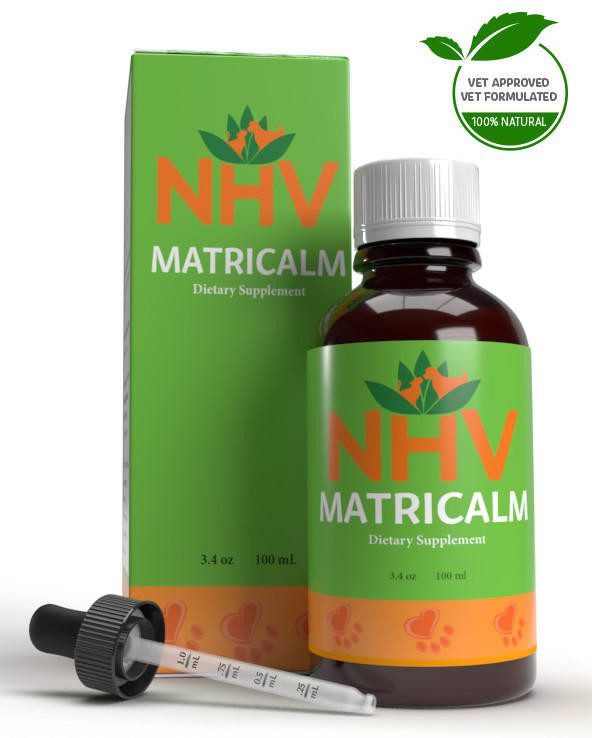
free shipping over $100 (USA & Canada)
1-877-937-4372 the pet expert hotline
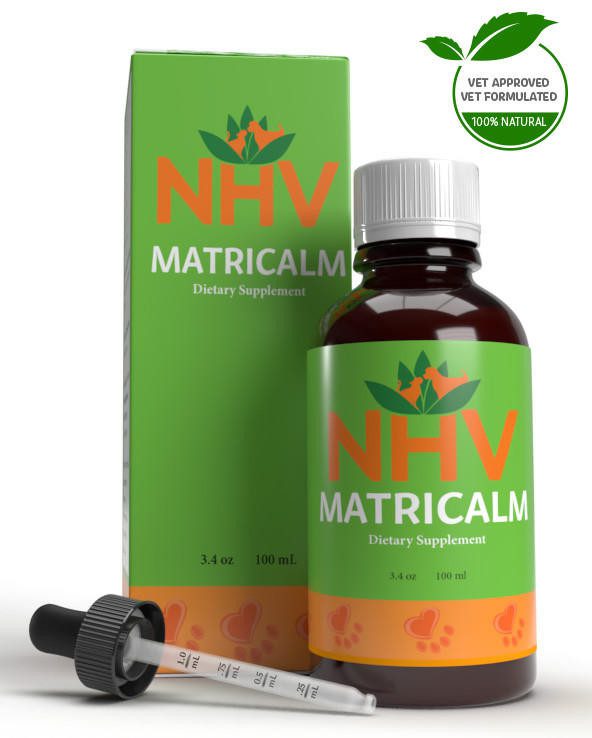
Natural Help for Stress Reduction, Anxiety Relief, Behavioral Problems, and Aggression in Cats

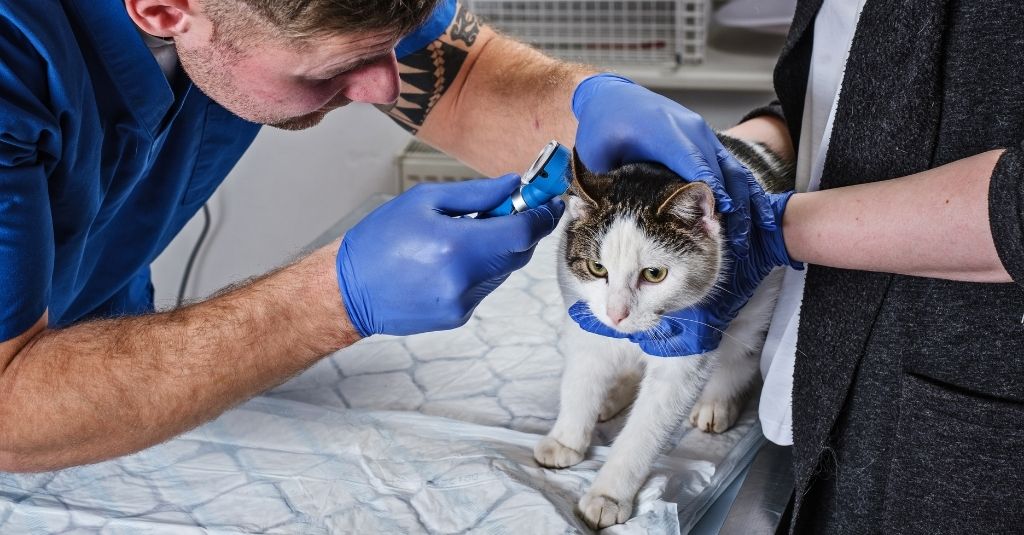
Vet visits can be overwhelming for both dogs and cats. When they work in clinics, veterinarians see it all. To help you with your next vet visit, here are my tips on how you can keep your pet calm during a vet visit.
Kitties are naturally attached to their homes, this represents their territory and where they feel safe. Cats are very structured with their routines and anything that breaks it can generate stress for them. Some cats can get used to traveling away from home, and everything that comes with it in terms of noises, smells, and unfamiliar faces, but in the majority of the cases, their routine involves spending the days at home.
Although some dogs may associate car trips with fun destinations such as the park or trail, some pooches can get extremely scared and even aggressive when they realize that they are actually going to the veterinarian. The lack of familiarity with the place, the noises and smells in the waiting room, and being handled by strangers are the main reasons for that. A recent study with dog owners actually showed that 30% of dogs are very stressed in the waiting room at the vet. In this research, 6.4% of dogs bitten their guardian at the vet and 11.2% had growled or snapped at the veterinarian. According to the same research, two-thirds of dogs spent more than 20% of the time displaying at least one indicator of stress, and 53.3% showed four or more behavioral signs of stress.
It is common for pets to feel stressed at the vet.
The number of stressed cats during visits to the veterinarian is even higher. Another study found that in many cases the veterinarian is not even able to examine the cat properly because of their stress and aggression. 71% of the cats in this study were reported to have been aggressive to a vet at some point and 24% had bitten or scratched their guardian at the vet.
This is extremely concerning because in some cases, pet owners feel discouraged to take their little ones to the veterinarian for check-up appointments which are essential for a healthy life.
The first thing to consider when you have a pet that gets stressed out with veterinary visits is to check if there are any at-home veterinary services in your area. More and more veterinarians are offering at-home services. This can actually benefit our pets since this option eliminates many stressful factors such as car rides, loud noises, unpleasant smells, and possible contact with other sick animals, for instance.
In case this is not an option, there are few things that can be done to make this experience less stressful for everyone:
Familiarize your kitten or puppy to clinic visits and to manipulations in a gradual and progressive way, and always associate any handling with positive emotions.
The sooner you start taking your pet to the clinic the better, especially when this visit doesn’t include any interventions. The idea is to get them used to the trip to the clinic, the veterinarian, the place, the noises, smells and to associate it with positive experiences. Make sure to have some food or treats and offer them right after as an extra incentive.
Prior to the appointment, check with the veterinarian what should be the best time for your little one’s last meal before leaving the house in order to reduce the chance of vomiting, peeing, or pooping during the trip.
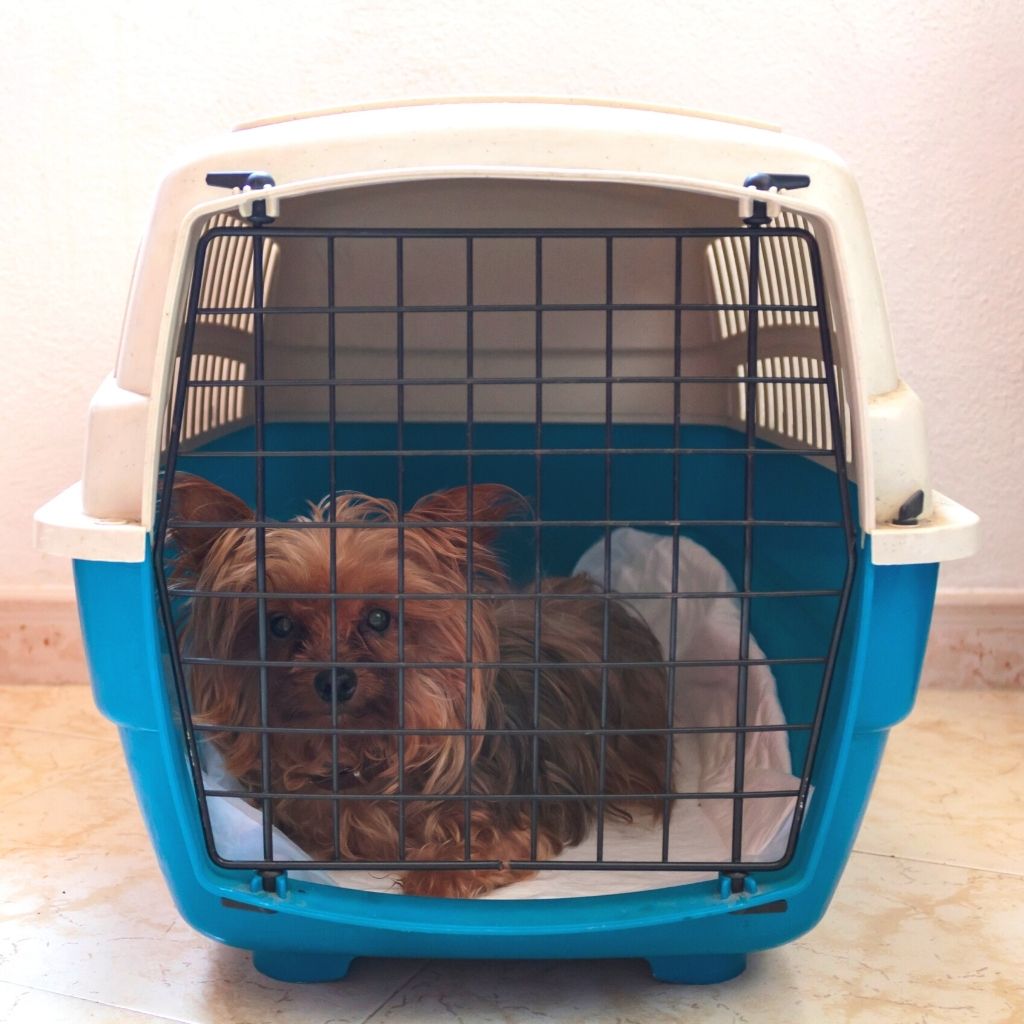
It’s very important to consider how you’re taking your pet to the veterinarian. A carrier for travel is the safest option and it’s also the most secure way to transport your pet to the vet clinic, especially for cats. This avoids any incidents on the way and especially at the reception when other animals can be around.
Sudden braking, acceleration, sharp turns, and loud noises will only add more stress to this event, so please avoid them and make sure that the temperature in the car is comfortable for your pet.
The ideal carrier should be easy to clean and you should be able to get your pet in and out of it very easily. Be aware of the size of the carrier, your pet should be able to stand comfortably and turn around with no issues. Ideally, the carrier must be sturdy, waterproof, and have a proper opening to allow easy access to the pet. Carriers with removable tops are great options as well because they allow your pet to remain nestled in the bottom while the veterinarian performs the physical examination. Make sure to add a small blanket in the bottom, or even a towel to provide a comfortable place to sit or lie down, and to soak up any possible fluids.
Each pet must have their own carrier, so in case you’re taking more than one at the same time, please provide each one of them with a proper carrier. Some pets feel more comfortable if you cover the carrier, so this is also an option to reduce stress.
A very common issue pet owners find is to put their pets into the carrier. This normally happens when the carrier is only seen by the pet when it’s time to visit the veterinarian, so it’s easily associated with a stressful situation. You can get your pet used to the carrier, by leaving it open in an area that your pet uses constantly, especially to rest or play, instead of keeping it stored away from them. You can also use it as a place to give treats or to feed your pet so it’s associated with positive experiences as well.
If possible, you can check with the staff if there’s a quieter time of the day so you can book your appointment instead of staying for a long time in the waiting room. Some clinics can be especially busier in the early mornings so it’s always good to know if that’s the case.
Another option is to call the vet clinic upon arrival to check-in since some of them allow you to wait in the car with your pet instead of taking them to wait in the reception area, which can be busy and loud. If you have your pet in a carrier, make sure to not tip it or bang it against any doorways on your way into the clinic and always place it away from other animals.
Your pet can be stressed after the visit to the veterinarian, so you’ll have to make sure that you’re not adding any more stress. Remain calm and relaxed at all times, always speaking to your pet in a calm and soothing voice.
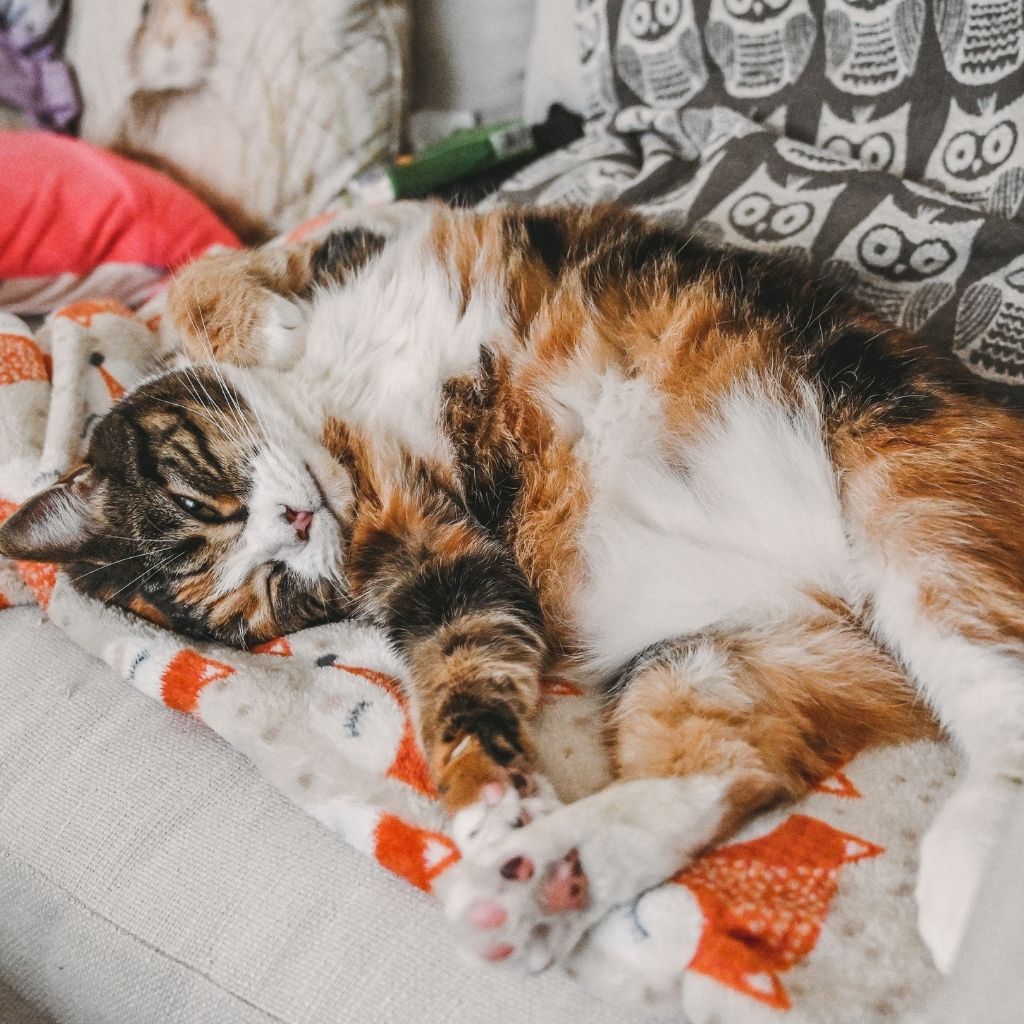
When you get home, leave plenty of fresh water available and feed your pet according to their regular schedule unless your veterinarian recommended otherwise. If possible, offer treats or at least leave them available. Don’t force your pet to eat treats or food right away and do not force them to cuddle with you if they don’t feel like it. Instead, let them take their time and allow them to rest properly so they can feel better again as soon as possible.
If your pet gets too stressed out during vet visits, you could also talk to your veterinarian about the possibility of including prescription medications to reduce the stress of veterinary visits. As all medications have side effects, it’s extremely important to check with your veterinarian first and never give any medication to your pet without the veterinarian’s recommendation.
NHV has two great supplements that can help with stress and anxiety and that can be added to your little one’s regimen at least 3 weeks prior to their vet appointments.
In case your little one is prone to stress, anxiety, and other behavioral issues, then you can add these supplements on a daily basis:
Matricalm. This supplement helps provide anxiety and stress relief for your pets since it is designed to reduce excitability. Matricalm has powerful herbs in its formula such as chamomile, which contains mild sedative properties, and passion flower, which is an effective and non-addictive sedative that helps cause a feeling of relaxation. Passion flower also has strong anti-inflammatory and discomfort-relieving properties.
Lesstress. Lesstress is an all-natural herbal formulation that can help calm dogs suffering from anxiety related to stress, like unwanted visits to the veterinarian. Besides chamomile and passion flower, Lesstress also has Reishi, an herb with sedative properties that also stimulates the immune system, and eleuthero, which helps dogs develop a healthy resistance to stress.
If you need additional information on how to make the best out of your vet visit, take a look at this article.
If you need help deciding which NHV supplements are right for your pet, one of our Pet Experts will be more than happy to assist you, don’t hesitate to reach out. Start chatting with us now by clicking the button below.
anxiety & aggression support

Support for Anxiety and Aggressive Behavior
buy 2 and save $3
3 month supply for a small to medium size pet
What is it?
NHV Matricalm is a supplement for relaxing nervousness and aggressive behavior in canines through herbal ingredients.
How Does it Work?
Why Should I Trust It?
Formulated with all-natural ingredients by expert veterinarians.
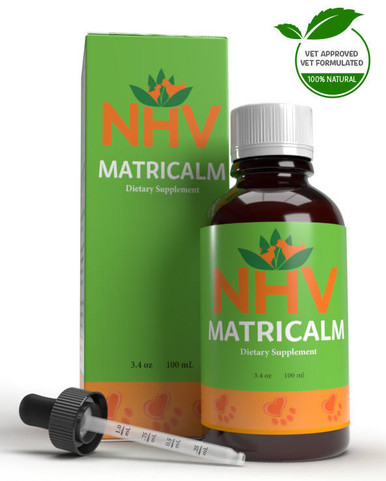
What is it?
NHV Matricalm is a supplement for relaxing nervousness and aggressive behavior in canines through herbal ingredients.
How Does it Work?
Why Should I Trust It?
Formulated with all-natural ingredients by expert veterinarians.
A Calming Supplement for Dogs
Dogs can become anxious or aggressive when exposed to other animals or to people they are unfamiliar with. Separation from an owner or a move to a new home can also trigger troubling symptoms including excessive barking, chewing, and inappropriate urination. A calming dog supplement can help your pet through these situations.
How Matricalm Calms Your Dog
Matricalm is formulated with powerful, natural ingredients that will help put your dog at ease. Ingredients like Chamomile, Passion Flower, and Hops have non-addictive sedative properties.
Ingredients like Lemon Balm and Valerian are especially helpful in easing anxiety. Your dog will find it easier to behave during times of stress, and may even be more receptive to training.
Use Matricalm to help ease anxiety in your dog, as a supplement for dog aggression, and to help reduce excitability in your pet.
Help Calm Your Dog Naturally
NHV supplements are formulated with all-natural ingredients by expert veterinarians with 20+ years of experience. They’re perfectly fine to take together with prescribed medications. Try Matricalm, the natural calming supplement for dogs, and see the difference it makes for you and your pet.
Chamomile – Contains sedative properties.
Passion Flower – An effective, non-addictive sedative.
Lemon Balm – An aromatic herb used for nervous disorders, excitability, and anxiety.
Valerian – Stops heart palpitations, relaxes spasms, relieves pain, and regulates the nervous system.
Hops – Eases tension and anxiety in pets.
Select your pet's weight to determine the correct dose.
To be taken twice daily. Determine your pet’s weight and then use the easy chart below to determine the correct dose. This is the minimum dosage.
Pet's Weight Dosage
0 - 15 lb = 0.5 ml
16 - 30 lb = 1.0 ml
31 - 45 lb = 1.5 ml
46 - 60 lb = 2.0 ml
61 - 75 lb = 2.5 ml
Over 75 lb = 3.0 ml
How to Administer
Shake well before use.
The easiest method is to use the dropper provide and places the drops into your pet’s food or favorite treat. You can also use the dropper and squirt directly into the pet’s mouth.
Some pets can be finicky, if this occurs consider hiding the drops in foods most pet’s love such as fish, chicken or yogurt or a favorite treat. If your pet only eats dry food then soak a few kibbles at feeding time.
For Best Results
Herbal dietary supplements are beneficial to the health and wellbeing of your pet and are safe for long-term use. Every pet responds to natural herbal supplements differently, therefore it is important to be consistent and administer the product daily. Supplements generally take two to four weeks to take effect, however this will vary from one animal to the next.
Product Storage
All NHV Natural Pet Products are pure herbal extracts and contain no artificial additives, preservatives or coloring. Shelf life after opening is 6 months and must be refrigerated after opening.
Cautions and Contraindications
Do not use Matricalm in pregnant or nursing animals.
Speak to your vet before using our products. A second visit is recommended if your pet’s condition does not improve, or deteriorates after continued use of the supplements.
All information provided by NHV Natural Pet Products is for educational purposes only.
A Calming Supplement for Dogs
Dogs can become anxious or aggressive when exposed to other animals or to people they are unfamiliar with. Separation from an owner or a move to a new home can also trigger troubling symptoms including excessive barking, chewing, and inappropriate urination. A calming dog supplement can help your pet through these situations.
How Matricalm Calms Your Dog
Matricalm is formulated with powerful, natural ingredients that will help put your dog at ease. Ingredients like Chamomile, Passion Flower, and Hops have non-addictive sedative properties.
Ingredients like Lemon Balm and Valerian are especially helpful in easing anxiety. Your dog will find it easier to behave during times of stress, and may even be more receptive to training.
Use Matricalm to help ease anxiety in your dog, as a supplement for dog aggression, and to help reduce excitability in your pet.
Help Calm Your Dog Naturally
NHV supplements are formulated with all-natural ingredients by expert veterinarians with 20+ years of experience. They’re perfectly fine to take together with prescribed medications. Try Matricalm, the natural calming supplement for dogs, and see the difference it makes for you and your pet.
Chamomile – Contains sedative properties.
Passion Flower – An effective, non-addictive sedative.
Lemon Balm – An aromatic herb used for nervous disorders, excitability, and anxiety.
Valerian – Stops heart palpitations, relaxes spasms, relieves pain, and regulates the nervous system.
Hops – Eases tension and anxiety in pets.
Select your pet's weight to determine the correct dose.
To be taken twice daily. Determine your pet’s weight and then use the easy chart below to determine the correct dose. This is the minimum dosage.
Pet's Weight Dosage
0 - 15 lb = 0.5 ml
16 - 30 lb = 1.0 ml
31 - 45 lb = 1.5 ml
46 - 60 lb = 2.0 ml
61 - 75 lb = 2.5 ml
Over 75 lb = 3.0 ml
How to Administer
Shake well before use.
The easiest method is to use the dropper provide and places the drops into your pet’s food or favorite treat. You can also use the dropper and squirt directly into the pet’s mouth.
Some pets can be finicky, if this occurs consider hiding the drops in foods most pet’s love such as fish, chicken or yogurt or a favorite treat. If your pet only eats dry food then soak a few kibbles at feeding time.
For Best Results
Herbal dietary supplements are beneficial to the health and wellbeing of your pet and are safe for long-term use. Every pet responds to natural herbal supplements differently, therefore it is important to be consistent and administer the product daily. Supplements generally take two to four weeks to take effect, however this will vary from one animal to the next.
Product Storage
All NHV Natural Pet Products are pure herbal extracts and contain no artificial additives, preservatives or coloring. Shelf life after opening is 6 months and must be refrigerated after opening.
Cautions and Contraindications
Do not use Matricalm in pregnant or nursing animals.
Speak to your vet before using our products. A second visit is recommended if your pet’s condition does not improve, or deteriorates after continued use of the supplements.
All information provided by NHV Natural Pet Products is for educational purposes only.
stress & anxiety support
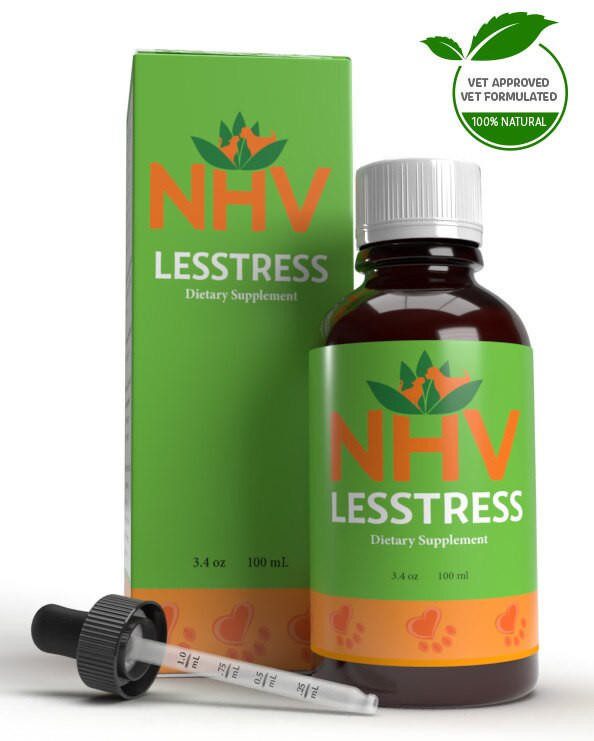
Natural Support for Canine Stress and Anxiety
buy 2 and save $3
3 month supply for a small to medium size pet
What is it?
Everyone knows what stress feels like, and we all know that too much stress can make us ill—high blood pressure, ulcers and even cancer can result from excessive stress. Like us, dogs can get stressed by numerous factors as well. Help your furkiddo relax into a long and happy life with NHV Lesstress - a natural dog stress support.
How does it work?
Why trust it?
NHV uses full-spectrum extracts of human-grade herbs, so your pet only gets the best.

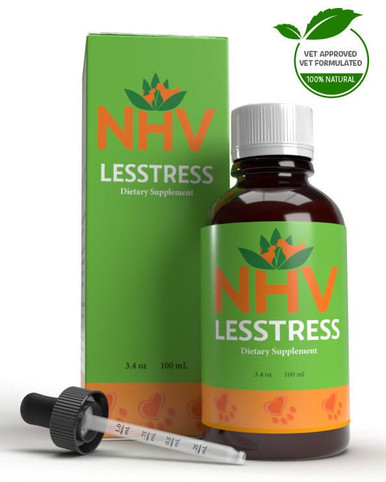
What is it?
Everyone knows what stress feels like, and we all know that too much stress can make us ill—high blood pressure, ulcers and even cancer can result from excessive stress. Like us, dogs can get stressed by numerous factors as well. Help your furkiddo relax into a long and happy life with NHV Lesstress - a natural dog stress support.
How does it work?
Why trust it?
NHV uses full-spectrum extracts of human-grade herbs, so your pet only gets the best.

Natural Dog Stress Reliever Supplemental Support
With a heightened sense of hearing and smell, small events that seem mundane to us can be terrifying and stressful for your dogs. Sometimes the stress is from the ride to the office, or maybe they are missing their human companions. This all contributes to changes in behavior like excessive panting, drooling, sweaty paws, dilated eyes, pacing, excessively shedding, or just completely shutting down. Some dogs become so stressed that it may lead to fear and aggression.
Other forms of stress in a dog’s life include:
In addition to panting, excessive barking/whining, chewing on themselves, shivering (when it’s not cold), panicked tail wagging, or tense muscles, stress can also cause GI tract issues such as diarrhea or vomiting.
The key to a healthy pup is balance. Too much or too little activity can be harmful, as well as too much or too little socialization. A balanced, clean diet also helps maintain the body and the mind. If your dog is susceptible to stress, you can use calming herbs like those found in NHV Lesstress. This formulation gently acts on the nervous system and immune system to provide a natural dog stress reliever.
How NHV’s Natural Dog Stress Relief Eases Stress and Anxiety
For stressful experiences such as separation anxiety, the loss or addition of a furry friend, special events (eg. fireworks) and illness (stress can cause conditions to worsen), the natural (non-addictive) sedative properties of Lesstress gently relax the nervous system and endocrine system. Ingredients like Chamomile, Passion Flower and Lemon Balm work to calm nerves while ingredients like Reishi, Eleuthero, and Echinacea Angustifolia are very beneficial for helping the body adapt to stress and illness and stimulate healthy immune function.
Help Support Your Dog Naturally
All NHV supplements like Lesstress are 100% natural and created by a holistic veterinarian and a master herbalist, specially formulated for pets. Feel free to contact our veterinary professionals to get more insight into your little one’s health and wellbeing.
Made with the finest, organically grown, or ethically harvested herbs. Made specifically for pets, vet-formulated and vet approved.
Lesstress for Dogs
Select your pet's weight to determine the correct dose.
To be taken twice daily. Determine your pet’s weight and then use the easy chart below to determine the correct dose. This is the minimum dosage.
Pet's Weight Dosage
0 - 15 lb = 0.5 ml
16 - 30 lb = 1.0 ml
31 - 45 lb = 1.5 ml
46 - 60 lb = 2.0 ml
61 - 75 lb = 2.5 ml
Over 75 lb = 3.0 ml
For small animals (rabbits, ferrets), avians and reptiles use 1 drop for every 2 lb of body weight.
How to Administer
Shake well before use.
The easiest method is to use the dropper provide and places the drops into your pet’s food or favorite treat. You can also use the dropper and squirt directly into the pet’s mouth.
Some pets can be finicky, if this occurs consider hiding the drops in foods most pet’s love such as fish, chicken or yogurt or a favourite treat. If your pet only eats dry food then soak a few kibbles at feeding time.
For Best Results
Herbal dietary supplements are beneficial to the health and wellbeing of your pet and are safe for long-term use. Every pet responds to natural herbal supplements differently, therefore it is important to be consistent and administer the product daily. Supplements generally take two to four weeks to take effect, however this will vary from one animal to the next.
Product Storage
All NHV Natural Pet Products are pure herbal extracts and contain no artificial additives, preservatives or coloring. Shelf life after opening is 6 months and must be refrigerated after opening.
Cautions and Contraindications
Do not use Lesstress in pregnant or nursing animals.
Speak to your vet before using our products. A second visit is recommended if your pet’s condition does not improve, or deteriorates after continued use of the supplements.
All information provided by NHV Natural Pet Products is for educational purposes only.
Natural Dog Stress Reliever Supplemental Support
With a heightened sense of hearing and smell, small events that seem mundane to us can be terrifying and stressful for your dogs. Sometimes the stress is from the ride to the office, or maybe they are missing their human companions. This all contributes to changes in behavior like excessive panting, drooling, sweaty paws, dilated eyes, pacing, excessively shedding, or just completely shutting down. Some dogs become so stressed that it may lead to fear and aggression.
Other forms of stress in a dog’s life include:
In addition to panting, excessive barking/whining, chewing on themselves, shivering (when it’s not cold), panicked tail wagging, or tense muscles, stress can also cause GI tract issues such as diarrhea or vomiting.
The key to a healthy pup is balance. Too much or too little activity can be harmful, as well as too much or too little socialization. A balanced, clean diet also helps maintain the body and the mind. If your dog is susceptible to stress, you can use calming herbs like those found in NHV Lesstress. This formulation gently acts on the nervous system and immune system to provide a natural dog stress reliever.
How NHV’s Natural Dog Stress Relief Eases Stress and Anxiety
For stressful experiences such as separation anxiety, the loss or addition of a furry friend, special events (eg. fireworks) and illness (stress can cause conditions to worsen), the natural (non-addictive) sedative properties of Lesstress gently relax the nervous system and endocrine system. Ingredients like Chamomile, Passion Flower and Lemon Balm work to calm nerves while ingredients like Reishi, Eleuthero, and Echinacea Angustifolia are very beneficial for helping the body adapt to stress and illness and stimulate healthy immune function.
Help Support Your Dog Naturally
All NHV supplements like Lesstress are 100% natural and created by a holistic veterinarian and a master herbalist, specially formulated for pets. Feel free to contact our veterinary professionals to get more insight into your little one’s health and wellbeing.
Made with the finest, organically grown, or ethically harvested herbs. Made specifically for pets, vet-formulated and vet approved.
Lesstress for Dogs
Select your pet's weight to determine the correct dose.
To be taken twice daily. Determine your pet’s weight and then use the easy chart below to determine the correct dose. This is the minimum dosage.
Pet's Weight Dosage
0 - 15 lb = 0.5 ml
16 - 30 lb = 1.0 ml
31 - 45 lb = 1.5 ml
46 - 60 lb = 2.0 ml
61 - 75 lb = 2.5 ml
Over 75 lb = 3.0 ml
For small animals (rabbits, ferrets), avians and reptiles use 1 drop for every 2 lb of body weight.
How to Administer
Shake well before use.
The easiest method is to use the dropper provide and places the drops into your pet’s food or favorite treat. You can also use the dropper and squirt directly into the pet’s mouth.
Some pets can be finicky, if this occurs consider hiding the drops in foods most pet’s love such as fish, chicken or yogurt or a favourite treat. If your pet only eats dry food then soak a few kibbles at feeding time.
For Best Results
Herbal dietary supplements are beneficial to the health and wellbeing of your pet and are safe for long-term use. Every pet responds to natural herbal supplements differently, therefore it is important to be consistent and administer the product daily. Supplements generally take two to four weeks to take effect, however this will vary from one animal to the next.
Product Storage
All NHV Natural Pet Products are pure herbal extracts and contain no artificial additives, preservatives or coloring. Shelf life after opening is 6 months and must be refrigerated after opening.
Cautions and Contraindications
Do not use Lesstress in pregnant or nursing animals.
Speak to your vet before using our products. A second visit is recommended if your pet’s condition does not improve, or deteriorates after continued use of the supplements.
All information provided by NHV Natural Pet Products is for educational purposes only.
travel support
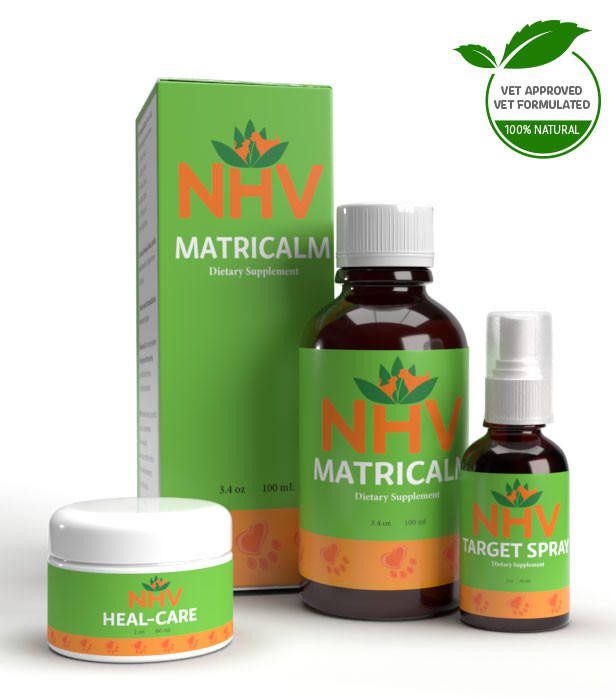
Matricalm, Heal Care Ointment, Target Spray
bundle and save with pet expert kits
3 month supply for a small to medium size
What is it?
Our Travel Essentials kit includes products essential for the travelling pet. Keep your pet calm, free of fleas, ticks and mosquitos and soothe damaged or burnt skin
How does it work?
Why trust it?
NHV supplements were developed by a holistic veterinarian and master herbalist with a combined 50 years of experience.
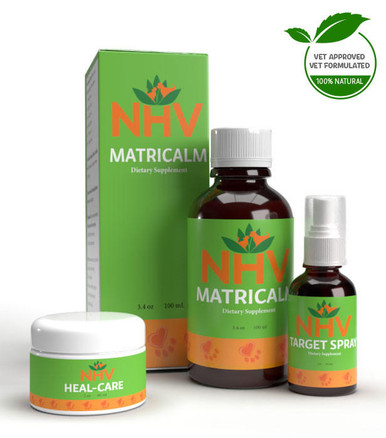
What is it?
Our Travel Essentials kit includes products essential for the travelling pet. Keep your pet calm, free of fleas, ticks and mosquitos and soothe damaged or burnt skin
How does it work?
Why trust it?
NHV supplements were developed by a holistic veterinarian and master herbalist with a combined 50 years of experience.
Help reduce aggression and anxiety in your pet with Matricalm, a natural herbal product designed to help reduce excitability in your pet. Pets can become anxious or aggressive when exposed to other animals or to people they are unfamiliar with. Separation from an owner or a move to a new home can also trigger troubling symptoms of anxiety
Safely rid your pet of insects and their eggs. Target Spray helps your pet rid itself of fleas, ticks, lice, and mosquitoes. Its soothing herbal formulation keeps insects away and calms skin irritated by the inevitable scratching bugs cause. Fleas are tiny, wingless insects that feed on your pet’s body by sucking blood. They can transmit disease, cause skin allergies, anemia, and generally irritate your pet. Many pets are allergic to flea saliva, which causes them to lick, chew, scratch, and rub the irritated area. This can often result in hair loss and secondary infections.
Many pets are busy animals prone to paw or skin injuries including bruising, sprains, cuts, wounds, burns and infections. Signs of injury are easy to spot and include obvious discomfort, limping, red and swollen pads, and a general reluctance to walk or run. Heal Care Ointment is a topical ointment designed to soothe and heal injured paws and skin.
MATRICALM
Chamomile – Contains sedative properties.
Passion Flower – An effective, non-addictive sedative.
Lemon Balm – An aromatic herb used for nervous disorders, excitability, and anxiety.
Valerian – Stops heart palpitations, relaxes spasms, relieves discomfort, and regulates the nervous system.
Hops – Eases tension and anxiety in pets.
HEAL CARE OINTMENT
Arnica – Relieves discomfort and inflammation, clears fungal and bacterial infections, and stimulates the immune system.
St. John’s Wort – Reduces inflammation, promotes healing, and acts as an antiseptic and analgesic.
TARGET SPRAY
Lavender – Contains volatile oils of low toxicity and tannins with antiseptic and insect deterrent action.
Rosemary – Rich in essential oils. Also has antiseptic, astringent, and anti-inflammatory properties.
Sweet-Scented Marigold – An effective insect deterrent that also helps eliminate ticks.
Neem – An effective insect deterrent that helps eliminate parasites and has significant healing properties.
European Pennyroyal – An insect deterrent that also soothes itchy skin.
Aloe Vera – Soothes and cools irritated skin.
Celandine –Protects the liver and can help against microorganisms.
Milk Thistle – Protects the liver from toxins.
Lemongrass Oil – An effective insect deterrent that contains essential oils.
Ceylon Citronella Oil – An insect deterrent that contains antiviral and antibacterial properties.
Tea Tree Oil – An effective antiseptic useful in the treatment of wounds and bites.
Select your pet's weight to determine the correct dose.
DOSAGE FOR MATRICALM
To be taken twice daily. Determine your pet’s weight and then use the easy chart below to determine the correct dose. This is the minimum dosage.
Pet's Weight Dosage
0 - 15 lb = 0.5 ml
16 - 30 lb = 1.0 ml
31 - 45 lb = 1.5 ml
46 - 60 lb = 2.0 ml
61 - 75 lb = 2.5 ml
Over 75 lb = 3.0 ml
For small animals (rabbits, ferrets), avians and reptiles use 1 drop for every 2 lb of body weight.
How to Administer
Shake well before use. The easiest method is to use the dropper provided and place the drops into your pet’s food or favorite treat. You can also use the dropper and squirt directly into the pet’s mouth. Some pets can be finicky, if this occurs consider hiding the drops in foods most pet’s love such as fish, chicken or yogurt or a favorite treat. If your pet only eats dry food then soak a few kibbles at feeding time.
For Best Results
Herbal dietary supplements are beneficial to the health and well-being of your pet and are safe for long-term use. Every pet responds to natural herbal supplements differently, therefore it is important to be consistent and administer the product daily. Supplements generally take two to four weeks to take effect, however this will vary from one animal to the next.
Product Storage
All NHV Natural Pet Products are pure herbal extracts and contain no artificial additives, preservatives or coloring. Shelf life after opening is 6 months and must be refrigerated after opening.
Cautions and Contraindications
Do not use in pregnant or nursing animals.
All information provided by NHV Natural Pet Products is for educational purposes only.
TARGET SPRAY
How to Administer
Topical Spray: Spray several times a day as need. It may some times be necessary to shave or trim your pet’s hair so that the Target spray reaches the affected area.
Caution
Do not spray near or into eyes or nose. Do not use in pregnant animals.
HEAL CARE OINTMENT
How to Administer
Topical ointment: Clean and dry paw pads. Apply to affected area 3 to 4 times per day until healed. It may be necessary to use booties or wrap the paw with gauze dressing so that your pet does not lick the ointment.
Caution
Do not apply on open or bleeding wounds. Heal Care ointment contains arnica which may cause a skin allergy on some very sensitive pet’s. Try the product on a hairless part of the body first to test for sensitivity
Help reduce aggression and anxiety in your pet with Matricalm, a natural herbal product designed to help reduce excitability in your pet. Pets can become anxious or aggressive when exposed to other animals or to people they are unfamiliar with. Separation from an owner or a move to a new home can also trigger troubling symptoms of anxiety
Safely rid your pet of insects and their eggs. Target Spray helps your pet rid itself of fleas, ticks, lice, and mosquitoes. Its soothing herbal formulation keeps insects away and calms skin irritated by the inevitable scratching bugs cause. Fleas are tiny, wingless insects that feed on your pet’s body by sucking blood. They can transmit disease, cause skin allergies, anemia, and generally irritate your pet. Many pets are allergic to flea saliva, which causes them to lick, chew, scratch, and rub the irritated area. This can often result in hair loss and secondary infections.
Many pets are busy animals prone to paw or skin injuries including bruising, sprains, cuts, wounds, burns and infections. Signs of injury are easy to spot and include obvious discomfort, limping, red and swollen pads, and a general reluctance to walk or run. Heal Care Ointment is a topical ointment designed to soothe and heal injured paws and skin.
MATRICALM
Chamomile – Contains sedative properties.
Passion Flower – An effective, non-addictive sedative.
Lemon Balm – An aromatic herb used for nervous disorders, excitability, and anxiety.
Valerian – Stops heart palpitations, relaxes spasms, relieves discomfort, and regulates the nervous system.
Hops – Eases tension and anxiety in pets.
HEAL CARE OINTMENT
Arnica – Relieves discomfort and inflammation, clears fungal and bacterial infections, and stimulates the immune system.
St. John’s Wort – Reduces inflammation, promotes healing, and acts as an antiseptic and analgesic.
TARGET SPRAY
Lavender – Contains volatile oils of low toxicity and tannins with antiseptic and insect deterrent action.
Rosemary – Rich in essential oils. Also has antiseptic, astringent, and anti-inflammatory properties.
Sweet-Scented Marigold – An effective insect deterrent that also helps eliminate ticks.
Neem – An effective insect deterrent that helps eliminate parasites and has significant healing properties.
European Pennyroyal – An insect deterrent that also soothes itchy skin.
Aloe Vera – Soothes and cools irritated skin.
Celandine –Protects the liver and can help against microorganisms.
Milk Thistle – Protects the liver from toxins.
Lemongrass Oil – An effective insect deterrent that contains essential oils.
Ceylon Citronella Oil – An insect deterrent that contains antiviral and antibacterial properties.
Tea Tree Oil – An effective antiseptic useful in the treatment of wounds and bites.
Select your pet's weight to determine the correct dose.
DOSAGE FOR MATRICALM
To be taken twice daily. Determine your pet’s weight and then use the easy chart below to determine the correct dose. This is the minimum dosage.
Pet's Weight Dosage
0 - 15 lb = 0.5 ml
16 - 30 lb = 1.0 ml
31 - 45 lb = 1.5 ml
46 - 60 lb = 2.0 ml
61 - 75 lb = 2.5 ml
Over 75 lb = 3.0 ml
For small animals (rabbits, ferrets), avians and reptiles use 1 drop for every 2 lb of body weight.
How to Administer
Shake well before use. The easiest method is to use the dropper provided and place the drops into your pet’s food or favorite treat. You can also use the dropper and squirt directly into the pet’s mouth. Some pets can be finicky, if this occurs consider hiding the drops in foods most pet’s love such as fish, chicken or yogurt or a favorite treat. If your pet only eats dry food then soak a few kibbles at feeding time.
For Best Results
Herbal dietary supplements are beneficial to the health and well-being of your pet and are safe for long-term use. Every pet responds to natural herbal supplements differently, therefore it is important to be consistent and administer the product daily. Supplements generally take two to four weeks to take effect, however this will vary from one animal to the next.
Product Storage
All NHV Natural Pet Products are pure herbal extracts and contain no artificial additives, preservatives or coloring. Shelf life after opening is 6 months and must be refrigerated after opening.
Cautions and Contraindications
Do not use in pregnant or nursing animals.
All information provided by NHV Natural Pet Products is for educational purposes only.
TARGET SPRAY
How to Administer
Topical Spray: Spray several times a day as need. It may some times be necessary to shave or trim your pet’s hair so that the Target spray reaches the affected area.
Caution
Do not spray near or into eyes or nose. Do not use in pregnant animals.
HEAL CARE OINTMENT
How to Administer
Topical ointment: Clean and dry paw pads. Apply to affected area 3 to 4 times per day until healed. It may be necessary to use booties or wrap the paw with gauze dressing so that your pet does not lick the ointment.
Caution
Do not apply on open or bleeding wounds. Heal Care ointment contains arnica which may cause a skin allergy on some very sensitive pet’s. Try the product on a hairless part of the body first to test for sensitivity
Published: July 13, 2021